By Ali Robidoux, MASCA Board Chair
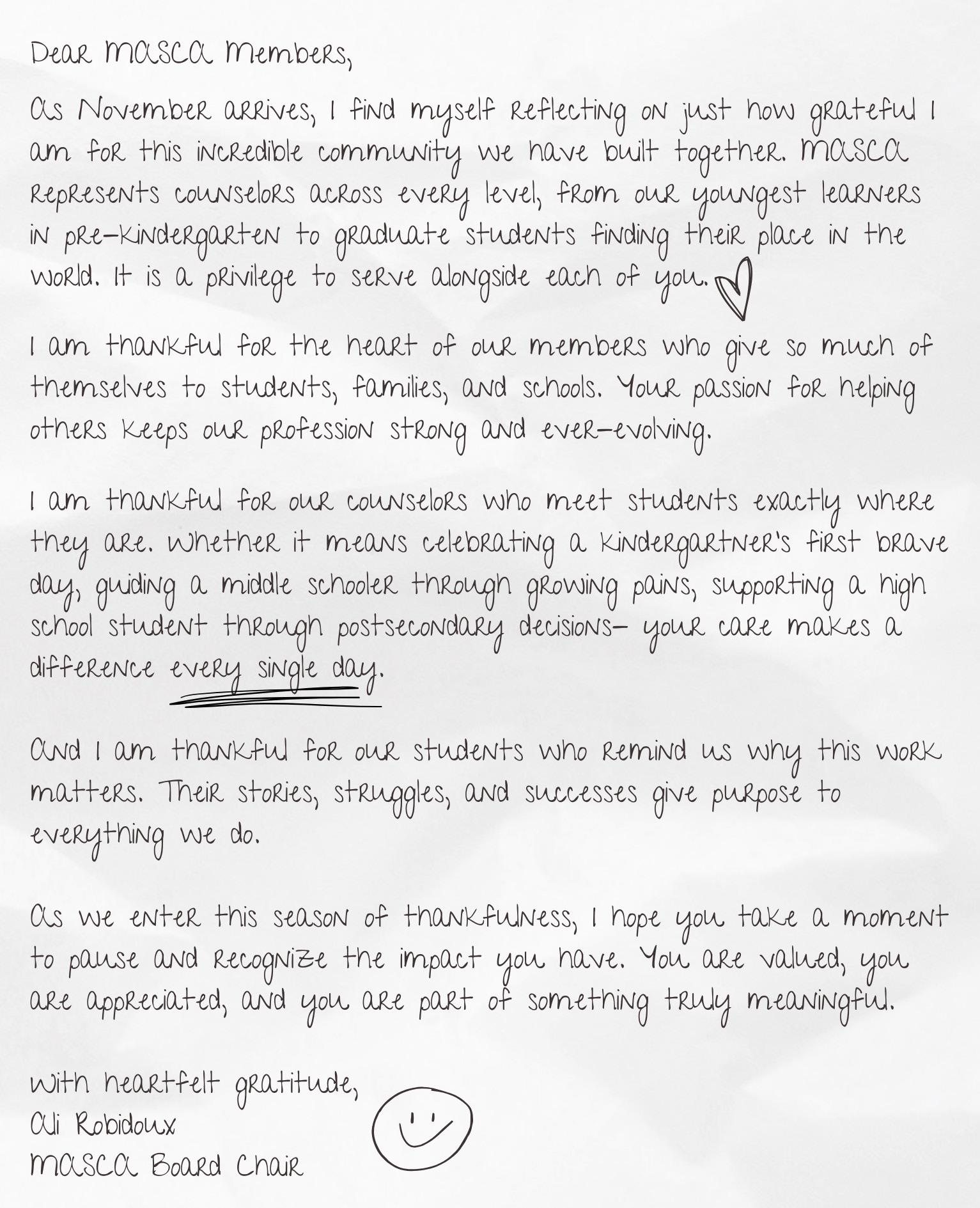
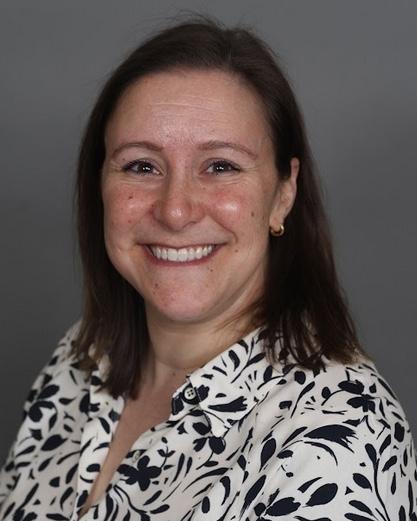

By Ali Robidoux, MASCA Board Chair


By Bob Bardwell, MASCA Executive Director
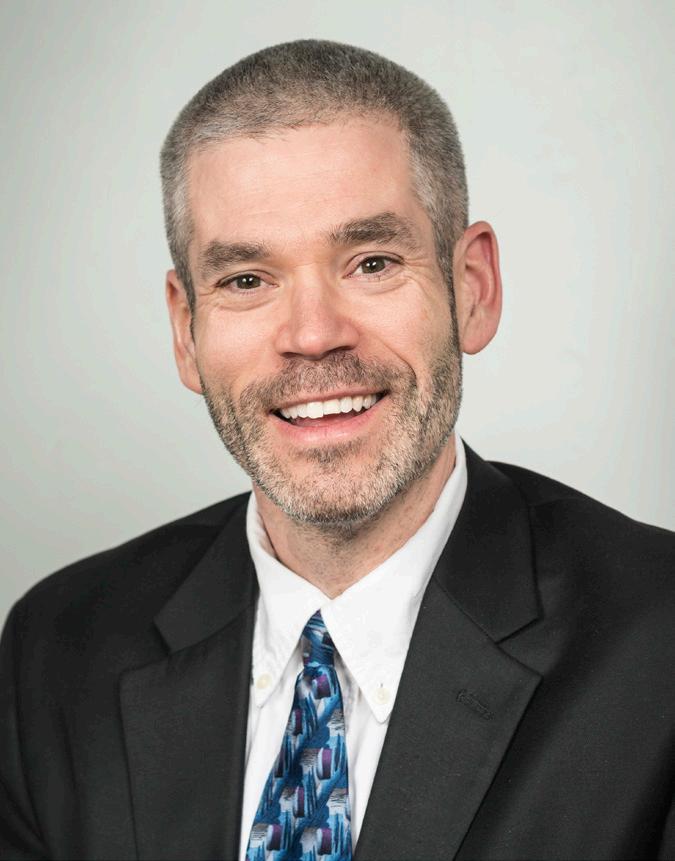
It’s already November and for most, a quarter of the school year is over. Don’t ask me where September and October went as it seems just like yesterday we were opening school for the 2025-26 school year.
MASCA is as busy as ever with all sorts of events, either in-person or virtually every week. If you have ever wondered what is happening or have questions about MASCA events, you have two options. First, you can always find our events on the calendar on the MASCA website. There you will find all the details for each upcoming event. If it does require a payment, you can pay online or if it is a virtual meeting, the link to register. Option two is to check out the events each Wednesday in the MASCA Matters newsletter. If you are not familiar with this newsletter, check your spam. If that fails, then email me and I will make sure you get on the list.
Have you ever wondered how MASCA decides which events to organize and offer to our members? Well, there is no exact science. Some of the events happen annually like the spring conference, celebrating National School Counseling
Week (NSCW) or our annual professional recognition program. Other events are organized by committees such as the Ethics Committee’s Legal and Ethical Symposium microcredential starting later this month or the annual elections coordinated by the Nominations & Bylaws Committee. Returning after a brief hiatus will be the Government Relations and Advocacy Committee’s Leadership Day at the State House on Wednesday, February 4, 2026 (details coming soon). School Counselor Summer Camp (SC2) is organized by a group of faculty. Technically not a committee, this group is tasked with planning the program each summer. Past participants are then invited to apply for an open faculty position and new faculty are selected by the returning faculty.
The leaders of the Special Interest Groups (SIGs) and Affinity Groups (AGs) have a great deal of latitude to plan their events. Some groups meet virtually each month (i.e. School Adjustment Counselor/School Social Worker (SAC/SSW) and Elementary) while others meet three or four times a year. Almost all groups meet in person at the spring conference (March 15-17, 2026 at the Sheraton Framingham). Remember, any member is welcome to attend any SIG meeting of interest and members who share an identify with the Affinity Group are welcome to join.
So, what about other programs like the PD day - Bridging Roles: School Counselors in Special Education Support – being held at Assumption on November 4 or the program at American International College on December 5 with Maria Sirois? These events are often planned by a small working group or the Executive Director. Denise Evans, one of the four Diversity Fellows, has coordinated the Assumption event and leaders of the SAC/ SSW SIG have planned the December event.
We are also trying a new approach that focuses on smaller working groups or task forces that have a very specific goal and likely a limited timeline. For example, we recently put out a call for folks interested in helping to plan MASCA’s National School Counseling Week (NSCW) activities. Seven members stepped forward and will help to coordinate our activities for the February 2-6, 2026 events (by the way, the national theme this year is School Counselors Amplify Student Success). This example is short-term and focused which al-
lows volunteers to contribute to these smaller projects with a short-term commitment. We also know that some members are much more likely to step forward to help in this format than volunteering for a committee or running for the Governing Board.
What about a Professional Development Committee you ask? MASCA used to have a PD Committee but with a full-time Executive Director, we are trying this new approach where either committees, leaders or newly established working groups plan our events. A committee of say 4-6 members can only plan so many events, but when you expand the number of people to coordinate and implement, then we can offer more programs. It also makes sense to have people focused on a specific topic to plan events that they are passionate about. For example, when the Diversity Fellows plan an event, it most likely is within their wheelhouse whereas a generic PD committee might not be able to plan such a high-quality event.
As Executive Director, I work with all committees, leaders and working groups and coordinate the MASCA calendar so I know what is happening, when we have openings in the calendar and areas of need. I also interact with numerous collaborators and colleagues outside of MASCA. Additionally, I also have frequent interactions with other state school counselor association leaders from
across the country and learn about what they are doing and find successful in their states. As a result, I am often able to bring new ideas and topics to MASCA.
Does any of this pique your interest to help plan and implement a MASCA program? If so, please reach out to me to inquire about available opportunities or simply fill out this form. Of course, there is no pressure to step forward or to do so now. While we currently have a lot of activities going on, we do not have any major volunteer needs. That could quickly change next month so keep an eye on your email or to the MASCA Matters newsletter as our volunteer needs are usually listed there.
I certainly recognize that that not every member can do all our activities. That is not a realistic belief. MASCA’s philosophy is that of our ~1950 members, that a variety of topics and delivery methods will appeal to the vast majority of our members. The key is to provide numerous options and opportunities to engage with MASCA to meet a wide assortment of members’ needs.
Speaking of new and exciting, be on the lookout for a first ever MASCA PD event coming in the spring. Hip-hop counseling anyone?

Don’t Miss MASCA’s Spring Conference! For more information or to register, go to https://ncyionline.org/conferences/mascac/.
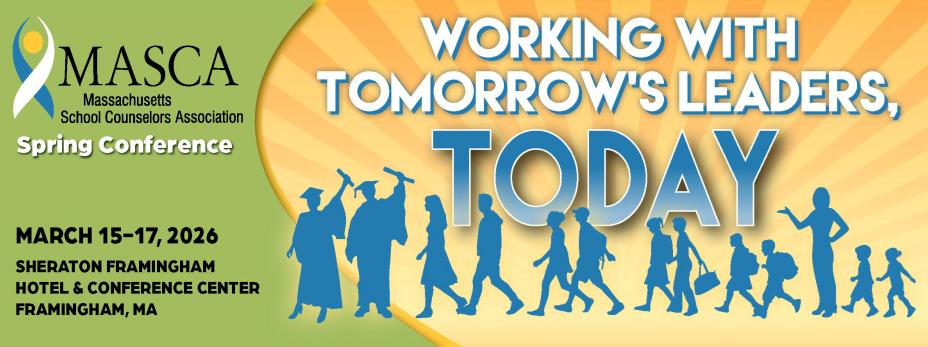
Why are you a MASCA member?
I joined MASCA looking for connections and to find ways to contribute to the school counseling field. Often in our roles, we can be part of a very small team, or in my case, the only counselor in the building. MASCA offers so many amazing opportunities to build your network of school counselors, increase your own knowledge, and give back to the profession.
What makes you unique as a school counselor?
I use my past experience to try and make sure that every student is seen. Many students may otherwise go through a day, week, or year feeling like the adults at school don’t truly see or know them.
What inspires you about being a school counselor?
Very simple - my students. Each day I walk into work and see my students they inspire me to make sure I am giving them my best each day. What career would you be doing if you were not a school counselor?
School Counseling is my second career, so I know this is what I am meant to be doing. In another timeline I would love to be Olivia Benson.
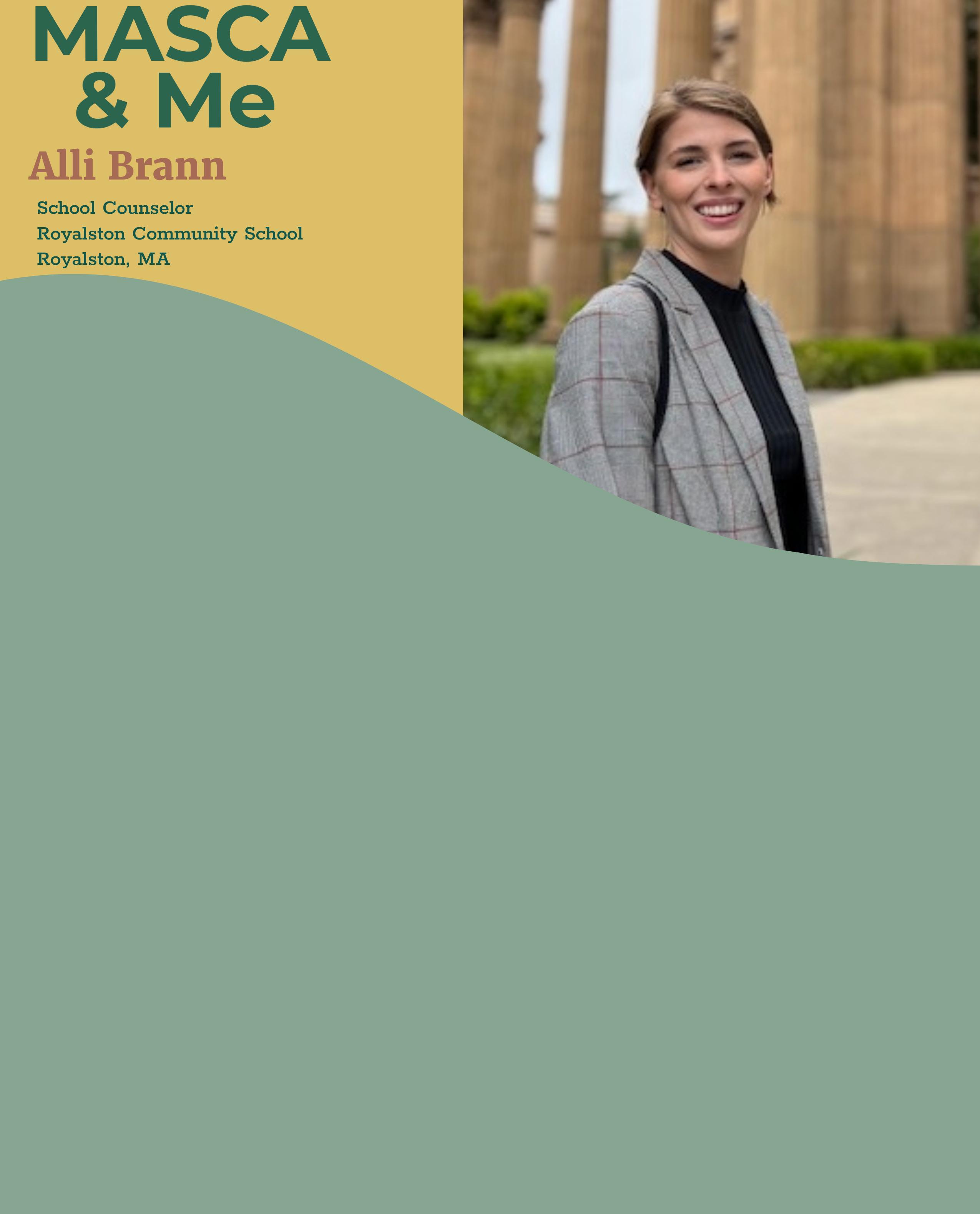
What is your favorite tool to use in your work?
I love finding tools that make the job easier. Lately it has been excel templates that help me track my small groups and progress monitoring data.
What words do you live by?
I am a big fan of a good inspirational quote so there are so many to choose from. But let’s go with “You’re only as cool as you treat people”
Why is it important to you to be part of a community of school counselors?
There are so many things that go into being a school counselor. Being a part of a community of school counselors allows you to be connected to professionals who are all experts at a different part of the role. How do you decompress/eliminate stress or refuel for the next day?
Spending time with my husband, listening to music (Taylor Swift has a song to fit every mood), or watching a show to take you into a different world just for a moment.
What brings you joy?
Spending time with the people I love - preferably while eating an amazing meal.
Share an example of something that you learned from one of your students. To find the positivity, joy and silliness wherever you can.
What is your favorite dessert?
Creme Brulee
What is your guilty pleasure?
This summer I have been obsessed with the show The Summer I Turned PrettyTeam Conrad forever.
What superpower do you wish you had?
Teleportation
What is your typical breakfast? Sausage, egg, and chess on an english muffin
What is one thing that you are really good at?
Listening
What is your coffee order?
Vanilla latte
Liam Adams
Elijah Anderson
Gail Avery
Martina Bekhit
Gracie Bergan
Lindsay Berger
Abigail Botelho
Emma Breckwoldt
Angela Callahan
Nicole Camp
Amanda Campos
Lindsey Castro
Morgan Coakley
Jenna Damato
Sophia Deleon
Avery DiMartino
Julie Ensign
Chloe Favreau
Courtney Fenno
Audrey Fulkerson
Jennifer Gabel
Kristin Gallo
Delia Gallon
Rachel Glaubitz
Kathryn Grande
Kejing Guo
Kelly Hall
Kiki Horgan
Jennifer Hymes
Mariel Jimenez
Emma Kaszanek
Zoe Kramer
Carrie Kulick-Clark
Victoria Ledoux
Emma Lodge
Lisa Looney Squire
Natalie Lorah
Kasey Lyford
Sarah Madsen
Jay Mahabeer-Budree
Dane Matejka
Cristie McGrath
Vanessa Medeiros
Jessica Moody
Raquel Mota-Hays
Lexie Mullins
Catie Murphy
Allison Paclisanu
Carrie Phillips
Anthony Pizzano
Julian Ramos
Jessica Russ
Jaylin Schultz
Christina Stanford
Madeleine Stone
Sophia Sullivan
Emma Thompson
Michelle Van Vleck
Emily Vidal
If you know or happen to meet any of our new members, please extend a very warm welcome!

The correct answer to last month’s Where’s Ollie? contest is: Salem/Salem Witch Museum. Step back in time in Salem, the town famous for its 1692 witch trials! Explore the Salem Witch Museum to uncover spooky stories, historical insights, and a glimpse into the lives of those accused. It’s a mix of history and mystery that’s fun for all ages!
Congratulations to Jason Phllips (Springfield Technical Community College), winner of the October Where’s Ollie? contest. Jason won a $10 Amazon gift card! Acknowledgement for Mike Penney (Abby Kelley Foster Charter), Ali Robidoux (New Bedford), Kerri-Lynn Ciulla (Melrose High School), Juliette Coatsworth (Foxborough Regional Charter School), Jennifer Pinhal (New Bedford High School), Amanda Berg (Granby), Sierra Archer
(Salem Public Schools), Jenn Bullard (Dracut High School) & Maura Ricardi (East Street School, Ludlow) for getting the correct answer. Fantastic job!
Where is Ollie this month? Submit your guess and win a $10 Amazon gift card. Submissions are due 11/15/25. One entry per person. Send us your guess using this form or scanning the QR code.


Adoption Awareness Month
College Application Month
Military Family Appreciation Month
National Career Development Month
National Family Caregivers Month
National Homeless Youth Awareness Month
National Runaway Prevention Month
National Scholarship Month
Native American Heritage Month Picture Book Month
11 Veterans Day 13 World Kindness Day
13–19 Transgender Awareness Week
16 International Day for Tolerance
16–22 National Hunger and Homelessness Awareness Week
17–21 American Education Week
20 Transgender Day of Remembrance
20 National Parental Involvement Day
21
Grief
Survivors of

By JC Topete Martinez, MASCA Diversity Fellow and School Counselor, Boston Latin School
Recently, during a parent-teacher conference, I was asked to help translate for a parent who mainly spoke Spanish. An everyday affair I had been accustomed to, but was not prepared for when I had to translate for the parent that their student’s recent academic decline was due to their father being detained by ICE (United States Immigration and Customs Enforcement). Immediately after translating this sentence, the energy in the room shifted. Tears started to flow, heads turned down, and the room fell silent.“What now?” was the question on everyone’s mind. Sure, the academic concerns for the student were still present, but it was clear that this recent encounter with law enforcement was still weighing down on the family and the student. For many in the education system, it had been tricky to find a way to address both the immediate and long-term needs of families and students impacted by recent immigration policies being implemented under the Trump administration. These polices have resulted in an uptick in large-scale immigration raids that have targeted predominantly blue states and cities such as Los Angeles and Chicago. (American Immigration Council, 2025) Massachusetts has not been immune to recent ICE operations, such as Operation Patriot 2.0, conducted last month, which led to the detention of more than 1,400 individuals (Klein, 2025).
What makes these raids further concerning is the populations they have actively chosen to target. Recent raids and operations conducted under ICE have specifically focused on identifying individuals and communities who may appear Latino/ Hispanic. Using predominant characteristics such as physical appearance and language spoken to justify detaining individuals has resulted in citizens being wrongfully detained. (Florido, 2025) The use of these characteristics has raised concerns among immigration advocacy groups, who argue these are discriminatory practices that violate the 4th amendment of the Constitution based on racial and ethnic background. Yet the recent Supreme Court ruling has allowed for this practice to remain in place, with further lawsuits still pending in the courts. (Urell, 2025)
Effects of Local Immigration Enforcement on School Enrollment” researchers sought to examine ICE’s 287 G partnership programs with local law enforcement and the impact it has had on local Latino communities. Under the 287g agreements, local law enforcement is deputized to take on the roles typically assigned to ICE federal agents to enforce immigration policy. (ILRC, 2023) Utilizing large-scale data analysis, researchers determined that these types of policies often lead to a decline in school enrollment among Latino populations. Noting that “this negative effect grew monotonically over time from roughly 5% in the adoption year to nearly 10% two or more years after adoption.” (Dee & Murphy, 2020)
For school counselors, these findings highlight the need to maintain service continuity and provide reassurance to families, particularly those of mixed status. Many families choose to relocate or withdraw their children from school, not due to academic concerns, but out of fear of deportation. Even for those who remain, the effects are profound. A 2021 study spanning seven California school districts found that ICE arrests in the local community often led to measurable declines in student academic performance, increased absenteeism, and lower school morale. (Kirksey & Sattin-Bajaj, 2021) Researchers Kirksey & Sattin-Bajaj further noted heightened reports of bullying and decreased perceptions of safety and respect within schools (Kirksey & Sattin-Bajaj, 2021). These findings reinforce the critical role school counselors play in maintaining a supportive environment for all students. When families feel unsafe sending their children to school, the resulting absenteeism and anxiety directly affect learning outcomes, particularly in core subjects such as math and English.
As counselors, staying informed about district policies related to ICE cooperation and immigrant support is essential. For example, in my district, Boston Public Schools (BPS), detailed information on ICE cooperation and guidelines for educators can be found online. Further, collaboration with administrative personnel can also help clarify procedures for supporting mixed-status families and ensuring student safety.
Below is a list of helpful and reputable local community resources you can use to further support families impacted by immigration policy:
Know Your Rights Resources: Immigrant Defense Project
As school counselors and educators, it is vital to understand how these rapidly changing immigration policies affect our communities. We are often the first to learn about circumstances impacting a student’s social and emotional well-being. Research has shown that immigration enforcement has significant and far-reaching consequences for student outcomes beyond the immediate trauma. In Thomas S. Dee and Mark Muprhy’s 2020 study “Vanished Classmates: The (continued on page 9)
By Nicole Ward, MASCA Graduate Student Liaison, Boston University
If you are reading this, odds are that you are deep in your graduate school grind or just starting your graduate school journey! As a fellow graduate student, I would like to share my thoughts on how to make the most of your internship year. Last year, I completed my internship at a high school in Lynn, Massachusetts. During that time, as well as through conversations with my peers about their internships, I learned some key takeaways. I call them The Three V’s.
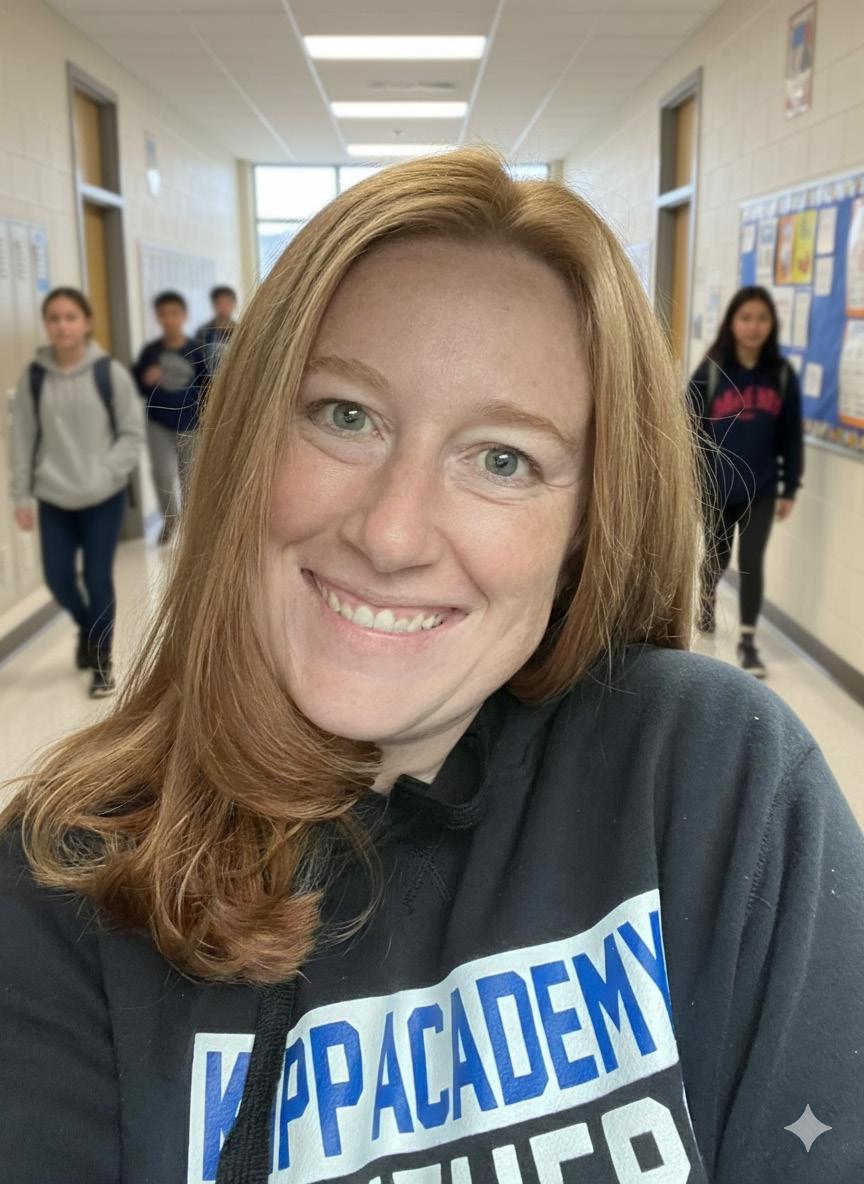
In the spring, I made an effort to be more visible, and I witnessed the immediate impact this had on my ability to connect with students and staff. By “being more visible”, I mean taking a 10-minute break and heading to the cafeteria during lunchtime, choosing to work in the common space instead of hiding in my office, and being in the hallways during transition times. By prioritizing being visible, I had more opportunities for casual, low-stakes conversations with students and staff, which helped build rapport. I noticed that students began to approach me with questions, concerns, and just to say hello because I was more accessible. Ask yourself: How can you be more visible at your site?
My practicum supervisor encouraged our class to find one area where we could add value to our internship site. For me, that was creating The Stall Street Journal, a monthly student-facing flyer that was posted in student restrooms. Each month focuses on a
different mental health and wellness topic, highlighting facts, warning signs, and strategies. Topics like test anxiety, healthy relationships, and suicide prevention were featured. I didn’t just come up with this idea on my own; I heard the Director of School Counseling mention that there was a need to get more information to students and parents. Then, I shared the idea as a way that I could help fill that need. I am grateful that I was able to find a small way to add value to my internship site. Not only
did I make a tangible impact, but I also added it to my resume to help with my future job search. I encourage you to listen for needs at your site and find a way you can help fill the gap!
You can just show up to supervision, or you can show up to supervision with intention. I learned more from my supervisor when I came prepared for our check-ins. Throughout the week, I kept a running list of questions and thoughts in a notebook. Before every supervision meeting, I would review my list and choose two items to bring up in the meeting. My supervisor helped by providing their perspective and spending time in discussion with me about the topic. Own your learning and be vocal in your supervision this year!
I hope that you find The Three V’s helpful. I encourage you to lean into them so that you can make the most of your internship!

(continued from page 7)
Massachusetts State Resources for Immigrant Populations: Mass.gov Immigrant Resources
Printable Know Your Rights Cards (Multiple Languages): National Immigration Law Center
Pathways to Citizenship: MIRA Coalition Citizenship Service Providers
Back-to-School Resources for Students and Families: Protecting Our Students Toolkit
Resources for Educators: MIRA Coalition for Educators
Ultimately, our responsibility as school counselors extends beyond academic support. We are often in the role of advocates for students’ safety, equity, and inclusion. Understanding how immigration enforcement and policy impacts our country allows us to understand our students’ lived experiences. Allowing us to respond with compassion, awareness, and action to ensure that every child, regardless of status, has the opportunity to learn in a safe and supportive environment.
Works Cited
American Immigration Council. (2025, October 9). Understanding ICE raids at American workplaces. [Fact sheet]. https://www. americanimmigrationcouncil.org/factsheet/understanding-ice-worksite-raids
Dee, T. S., & Murphy, M. (2020). Vanished classmates: The effects of local immigration enforcement on school enrollment. American Educational Research Journal, 57(6), 2251–2289. https://doi. org/10.3102/0002831220935576
Florido, A. (2025, July 4). “Antagonized for being Hispanic”: Growing claims of racial profiling in LA raids. NPR. https://www. npr.org/2025/07/04/nx-s1-5438396/antagonized-for-being-hispanic-growing-claimsof-racial-profiling-in-la-raids
Immigrant Legal Resource Center. (n.d.). 287(g). ILRC. https://www.ilrc.org/practitioners/national-map-287g-agreements
Kirksey, J. J., & Sattin-Bajaj, C. (2021). Immigration arrests and educational impacts: Linking ICE arrests to declines in achieve-
submitted by Julia Cahill-O’Shea, Secretary
Cynthia Esielionis and Jodi Then, co-chairs of the MA Model Committee, provided an overview of the committee’s history and challenges, noting declining participation, limited awareness among school counselors, and decreasing MARC and MARC Jr submissions. They highlighted that the MA Model, developed over two decades ago, is viewed as outdated and potentially misaligned with current school counseling roles. A committee survey revealed a lack of unity among counselor educators regarding how the MA Model is taught, though all agreed on the need for a comprehensive counseling program. Persistent obstacles include outdated resources, broken links, and obsolete appendices referencing frameworks and organizations that have since evolved or been absorbed into others, such as ASCA.
The group discussed next steps, including whether to rename the committee—possibly to “Comprehensive School Counseling”—to boost engagement and better reflect current practice. Other options considered included revising the model to a new “MA Model 4.0” or aligning more closely with the ASCA National Model, which most other states already follow. Updates from Board Members underscored DESE’s support for MASCA priorities, the forthcoming DESE website, and broader shifts in schools that could influence the model’s future direction. Breakout discussions aimed to gather input from attendees on the model’s relevance, future structure, and the potential benefits of rebranding or realignment.
The meeting was called to order by Ali Robidoux at 4:38 p.m., followed by the approval of the agenda and the June 6 and June 24, 2025, meeting minutes. Executive Director Bob Bardwell shared updates on meetings with Commissioner Martinez and Secretary Tutwiler, statewide initiatives such as the Graduation Council, and ongoing efforts to address the school counselor shortage. He also discussed upcoming professional development events, media outreach, and strategies to engage younger members through focus groups. Bob reported steady financial progress toward MASCA’s annual goal and upcoming presentations to support the counselor pipeline. John Crocker raised the importance of vetting professional development content to ensure quality for members.
Financial reports covering July through September indicated a $28,000 shortfall due to event and payroll expenses but noted that income is improving. MASCA profited $41,000 in the prior fiscal year, showing positive long-term growth. The board approved the 2024–25 financial statements and endorsed a committee name change from Member Services to Member Engagement to reflect inclusivity and belonging. Updated governing documents—the Policies and Procedures Manual and Leadership Handbook—were also approved, with board members asked to confirm their review via a Google Form in the near future. Reports from various committees, including Conference, Ethics, Advocacy, and Diversity Fellows, were received for reference before the meeting.
A member request prompted discussion on making a statement regarding rising antisemitic incidents and the Massachusetts Special Commission’s report on combating antisemitism. The board affirmed its stance against all forms of hate and emphasized supporting affected students through trauma-informed practices and access to resources. The Diversity Fellows are developing tools to help counselors address these issues, and feedback is encouraged during the state’s curriculum review period. MASCA reaffirmed its general anti-discrimination policy and will continue the discussion in future meetings. Announcements included confirmation of Bridgewater State University as the 2026 Summer Camp site, updates on the new website, and details about upcoming board nominations and elections. The meeting adjourned at 5:56 p.m.
ment, attendance, and school climate and safety in California. AERA Open, 7(1), 1–17. https://doi.org/10.1177/23328584211039787
Klein, A. (2025, October 17). ICE says over 1,400 arrests made in second Mass. immigration enforcement surge. NBC Boston. https://www.nbcboston.com/news/local/ice-operation-patriot-2-massachusetts/3828531/
Urell, A. (2025, September 17). Supreme Court allows stops based on race to continue. Equal Justice Initiative. https://eji.org/news/supreme-court-allows-stops-based-on-raceto-continue/
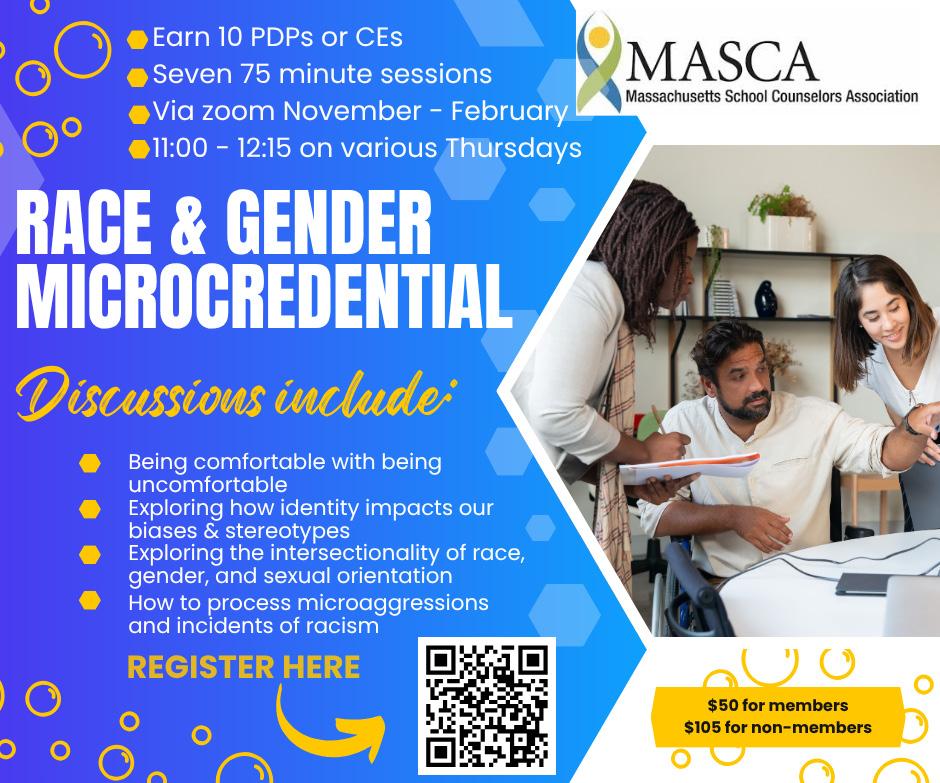
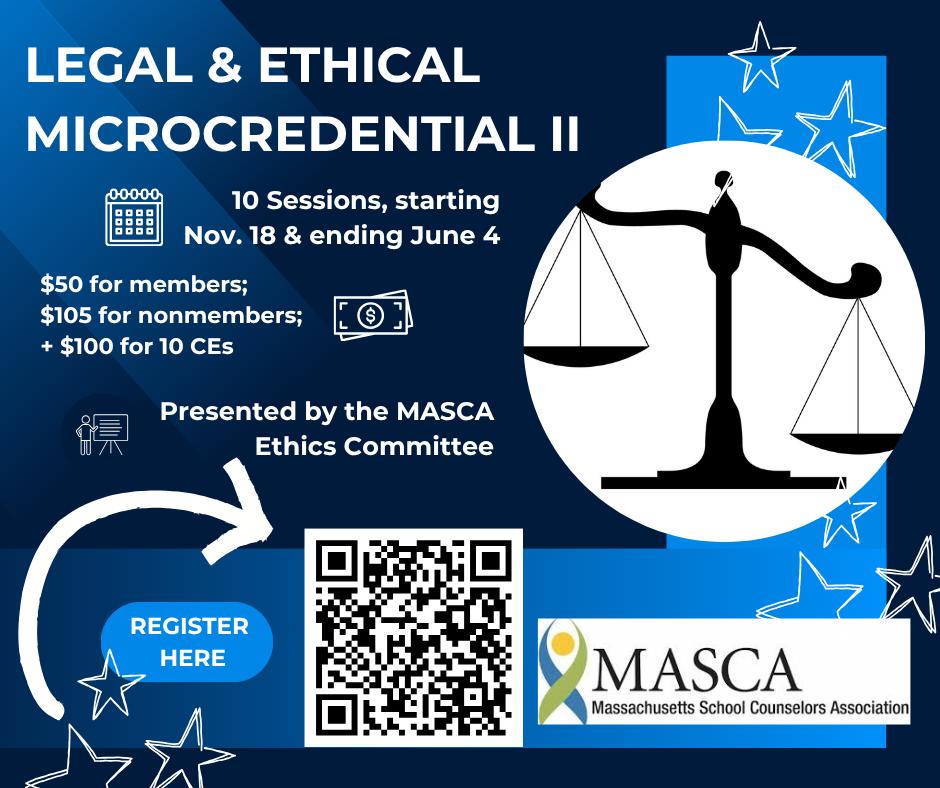
by Jennifer Pinhal, MASCA Emerging Leader and Early College School Counselor, New Bedford High School
Early College programs are redefining student postsecondary success. By giving students opportunities to take college-level courses while earning their high school diploma, we are bridging the gap between secondary and postsecondary learning.
So, what is Early College? I’m so glad you asked! As the Early College School Counselor at New Bedford High School, I’m excited to explain this amazing opportunity for high school students. Early College is a cohorted program that gives students the opportunity to take predetermined college courses in high school while still earning their high school diploma. These college courses are designed to be highly transferable and to meet both high school and college graduation requirements.
An Early College program is designed to assist students who are underrepresented in higher education and those who aspire to go to college but may have never imagined that opportunity for themselves.
Do we see a theme here? Opportunity! Every high school runs its Early College program differently, and I want to tell you about New Bedford High School’s Early College Program. We have two designated partners and one in the process: Bristol Community College, the University of Massachusetts Dartmouth, and Bridgewa-
ter State University (currently in the designation process). Each cohort has specific courses that students take.
Unlike dual enrollment, where students choose their own college courses, the Early College Program follows a pre-designed cohorted model. Along with the college courses, our students take OneGoal, a college and career preparation course. On top of all these opportunities, they also have me,the Early College School Counselor, who assists with their academic, personal/ social, and college and career readiness development.
You may be asking yourself, “Why is she so excited to talk about this program?” I’ve seen the direct impact on students and how they have grown in knowledge, skills, and confidence. Educating both students and parents about postsecondary options and success is essential. We’re not just helping students take college classes, we’re helping them build the belief that when they get to college, they know they can succeed, because they already have.
We also teach them the skills they’ll need in college: how to contact an academic advisor, how to reach out for support services such as tutoring, and how to access accommodations from a 504 plan or IEP. These are
the gaps we aim to close through the Early College Program so that when students enter their freshman year, they are ready to persist and earn their degree.
As the school counselor for the NBHS Early College Program, I work on keeping students accountable. I make sure that if they are struggling academically, they understand themselves enough to create goals and action steps to grow as learners. I also help them recognize their strengths, reflect on challenges, and build the confidence to take ownership of their learning. Through regular checkins, collaboration with professors and our higher education partners, and personalized support, I aim to ensure that every student feels capable and prepared to succeed in both their high school and college courses.
The Early College journey shows students what is possible when they take advantage of unique opportunities and when they believe in themselves. They leave high school not just with college credits, but with the mindset, skills, and determination to keep building their future. At NBHS, we are proud to watch our Early College students lead the way toward a future filled with opportunity and success. Each Early College graduate proves that with hard work, support, and perseverance, anything is possible.

By Judith Josephs, Ed. D
The following article with embedded videos demonstrates the use of Digital Media in an engaging and useful manner for students and School Counselors. Digital media is useful in the field of Counseling to educate, train, improve, and entertain. Embedded in the media TV shows are pictures of new labs, updated equipment, and professional work environments. Digital media introduces more PERSONALIZED CONTENT. It builds community and social interaction.
One of the ways to document successful resources in School Counseling is to highlight changes taking place in the community that you serve. Video #1 shows a change in a local university involving a major building program adding to the career enhancement of students. Video#2 highlights a building resource project that brings an important resource to the community such as additional shelters for students and families in need. Video #3 focuses on a resource in highlighting Scouting for women entering the Adventures in Scouting Program as well as Women in the Eagle Scouting Program. This resource opens a pathway to careers in many leadership fields. Video #4 highlights the largest investment in the history of the City of Lynn taking place on the waterfront. This is an important resource for student employment, events, internships, and recreation. Video #5 offers a building addition to the community in the form of an Early Learning Center offering many job opportunities for student careers.
What is the VALUE of this article to School Counselors and Counselors in Training to utilize community partnerships to enhance School Counseling?
From my experience as a longterm school counselor and college professor, I find it very helpful to be able to communicate and connect with the students about new and existing organizations and leaders making a difference in the community that we serve. Partnerships with community organizations allow counselors to connect students and families to external organizations dealing with student problems and family difficulties.
In this article the following community partners include homelessness, poverty, early childhood programs, family stress, community leaders, economic development, and local colleges. When school counselors have partnerships in place, they can help to bridge the gap with student problems and access services more quickly. These partnerships can positively enhance the work of school counselors and those training to become counselors. This extends the counselor’s reach beyond the walls of the school.
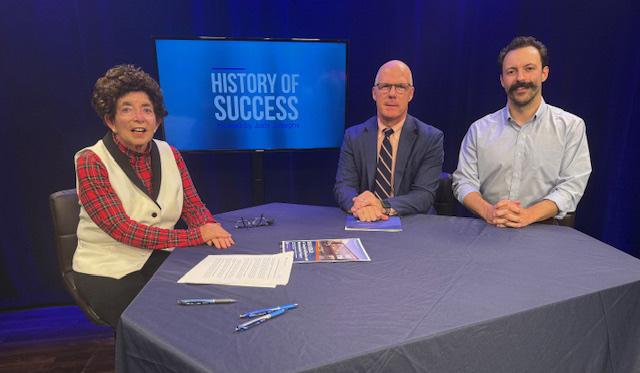
Judy Josephs with President Salem State University John Keenan and Jake Cotter, member of Salem State University Alumni Association Board
A transformation of Salem State University Campus with a major building project serves both students and the community.
History of Success, a Lynn Community Television program hosted by Judith Josephs, recently featured Salem State University President John Keenan and Jake Cotter, a member of Salem State’s Alumni Association Board, to discuss SSU BOLD, a campus unification and modernization project that recently broke ground.
SSU BOLD incorporates three major projects: the renovation of the Horace Mann Building to provide a new home and state of the art facilities for several programs currently on South Campus; the expansion of Meier Hall with a new attached science building to provide critical lab space to several science programs; and a decarbonization project to provide heating and cooling of the new spaces reducing dependence on fossil fuels.
Among the academic programs greatly benefiting from SSU BOLD are Salem State’s Nursing program, which has seen an increase in enrollment as incoming students will use the new facilities as juniors and seniors. The renovation of Horace Mann and the new Science Building will bring highly anticipated upgrades to all housed programs offering students a competitive edge toward 21st-century jobs and career success.
SSU Bold will breathe new life into the Horace Mann building by transforming it into a state-ofthe-art facility for the majority of
(continued from prev. page)
the Maguire Meservey College of Health and Human Services including Criminal Justice Healthcare Studies, Occupational Therapy and Nursing Programs. A significant overhaul will reflect 21st century education. There will be five new office suites, two Bedside Skills Labs, two Nursing Simulation Suites, and one Occupational Therapy Lab.
SSU Bold adds a new science building expected to open in the Fall of 2027. SSU Bold also brings seven new high-intensity teaching labs and support spaces to Salem State. It provides much needed, modernized and flexible lab space largely for, but not limited to biology, chemistry and geological sciences, while keeping all courses in these programs housed within the same building.
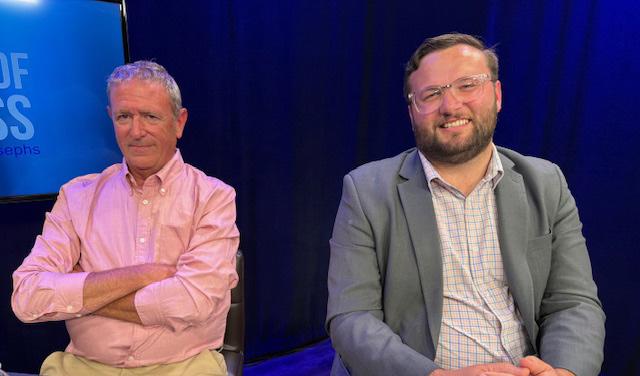
State Representative Sean Reid and Mark Evans, Chief Executive Officer Lynn Shelter Association
Lynn Shelter Association is dedicated to meeting individuals and families where they are on their journey through life. There are three welcoming family shelters, over 100 permanent supporting housing units, a low threshold individual shelter, a dedicated street outreach team and several specialized community-based services. Services provided in-
cluded Housing First priority. To use Housing First principles is to offer individuals and families a pathway to hope and stability. Reid House is a new residence dedicated to providing safe shelter for families. A recognition addressing the issue of housing insecurity is currently one of the state’s top priorities.
The Affordable Homes Act was passed to counter rising housing costs in Massachusetts. Five billion dollars were allocated to provide more housing for adults and families. There is a change in public sentiment because more individuals and families find themselves suddenly without a place to live. There is a supply and demand issue. More than 200,000 units will be built to fill the gap between need and demand.
In 2025 Lynn Shelter Association will be opening a new modern housing shelter, the completely renovated Osmund Hotel, which will add double square footage to their current shelter space. It will provide a medical clinic, courtyard, vocational opportunities, and opportunities to assess needy individual situations.
The original Osmund Hotel was built in 1899. The renovated Osmund Hotel will look like a historical building, respectful of the community it serves. There will be a private courtyard for people to go. In late 2025 Osmund Building will offer new programs within its historical buildings. Adult shelters will be on the bottom floors. There will be permanent supportive housing. Needy individuals and families will be attached to a Case Manager. The goal is to keep needy people who are housed to remain housed. Lynn Shelter Association stays close to sheltered families for a few years.
There will be a Courtyard with a
safe place for people to go without loitering. Climate change has changed the way people think about homelessness. People from all walks of life could find themselves temporarily without a place to live, especially with climate change issues and natural disasters affecting us all.
Homelessness is an urgent issue. Public sentiment is changing, impacting generations of families. Children can’t afford to buy homes near parents or grandparents. This issue is affecting many members of the population.
Lynn Shelter Association has been in existence for 40 years and is closely connected to the community. The organization is proud of how to embrace the mission of serving the population and meeting its demands.
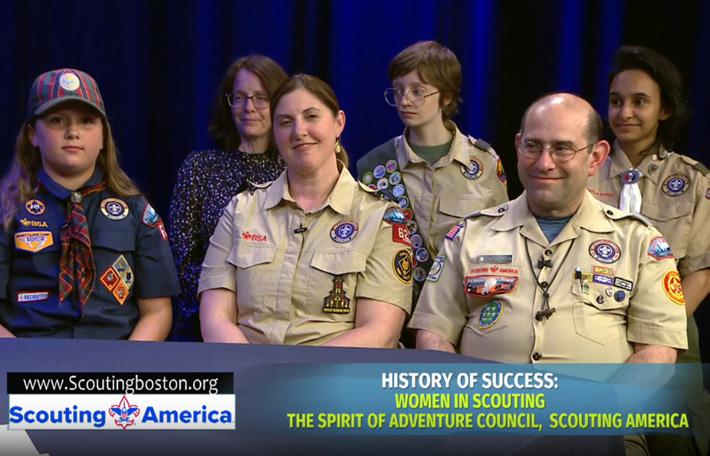
Jonathan Pleva, Director of Field Services and Chief Operating Officer of the Spirit of America Council, Mira Plante, Eagle Scout, Shannon Skilling, mom and past Scoutmaster of Girls Troop, Gracelyn Skilling Eagle Scout, Emma Case, Cub Scout, Erin Casey, mom and Den Leader
Women in Scouting involves outdoor programs and a connection to nature, as well as wilderness survival. The Spirit of Adventure Council serves 7200 young people. K-5 includes Cub Scouts. Scout USA includes 18-year-old teens with merit badges and Eagle Scouts.
(continued next page)
(continued from prev. page)
Scouts explore from l4-20 years old different career pathways. Cub Scout Programs are led by parents. Scout USA plan their own program and decide what they want to do such as major events. Skills involved include cooking with mom, biking, power board, camping in the snow, and hiking. Eagle Scouts start at age l6. Boston Scouting Association involves planning, taking care of each other and themselves, and the importance of persistence to reach goals. Scout master is part of a teaching and coaching program to help plan trips and have fun. Eagle Scouts demonstrate leadership, citizenship, and management of people. They organize events, show tenacity, keep going when things get rough, getting along with others, horseback riding, and ice skating on the Bay of Fundy Canadian trip.
Mira Plante was one of first Eagle Scouts in January 2019. She was the only girl in the 2020 program to achieve the first Eagle Scouts rank. This endeavor took 115 years for women to be allowed in the program. Computer and nature connections together help to benefit the setting up for success for students in building skills, applying to college, and demonstrating a connection to Scouting and the community. Eagle Scouts help young people develop new interests and skills which will help them all through life.
Large Community Economic Development Resource for students providing job creation, transportation, housing, public space, and commercial and residential opportunities. Counselors need to know what resources are available to meet student needs. This TV show highlights the possibility of future jobs, affordable housing for families, new methods of transportation, and public space for community events such as awards ceremonies or festivals.
The largest investment in the history of the City of Lynn and the surrounding communities is taking place along the LYNN waterfront. Construction has begun nf an 8-acre park including a gateway to Lynn and the North Shore, restaurants, additional ferry boats, mixed and balance of commercial and residential developments along the waterfront.
As the Lynn Waterfront development expands, the city will bring in beautiful parks with the possibility of many concerts and educational events. There is a wow factor associated with such beautiful parks. The park will offer other activities such as basketball, pickleball, tennis, and other recreational opportunities.
Lt. Governor Kim Driscoll from the Seaport Economic Council is promoting living on the waterfront. This location provides an opportunity to showcase the community. The city is looking to bring the Bio industry as part of a movement towards bringing the jobs of the future into the community.
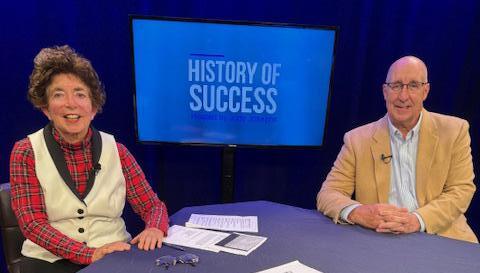
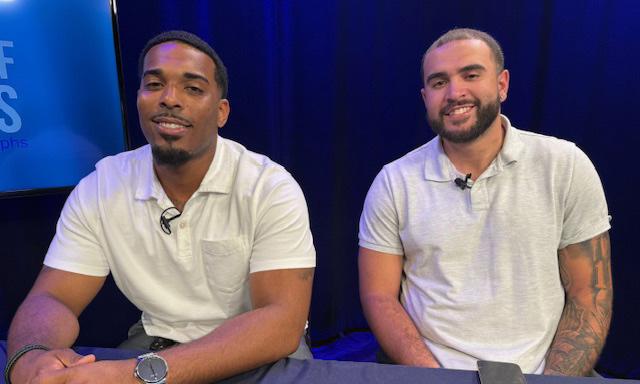
Joshua Perez. Assistant Finance Coordinator. Keith Ridley Special Project Coordinator
There will be a new Gregg House Early Learning Center built in the City of Lynn. School Counselors need to be aware of programs offered in the new Learning Center. Gregg Neighborhood Housei is a resource for a city partnership with the Lynn Public Schools
Currently, the early childhood program in Lynn provides care for over 500 children aged one month to thirteen between three locations in the city of Lynn. The first location is the Gregg House Infant and Toddler (ages 1 month to 2.9 years with 62 children, the second is the Gregg House Preschool ages 2.9 to 6 years, and the third is the Gregg House School ages 5 to 13 years with an enrollment of 352 children. Gregg House holds the largest Department of Children and Families Childcare contract with the city of Lynn. More than 80% of Gregg House families are considered low income. All programs provide meals and snacks free to all children in the program. 519 children are enrolled in the program.
There is a need for new space for the Preschool and Infant Toddler programs. The programs have over 100 children on a waitlist due to not having the capacity to meet the growing needs of families. Gregg Neighborhood House has obtained additional property in the city so that they can expand the service of an additional 167 children and upgrade to a state-ofthe-art facility.
(continued next page)
(continued from prev. page)
The new Center will allow for a transition from two separate Infant and Toddler and Preschool sites to the largest licensed childcare center in the city. There will be an increase of 167 children offering over 300 childcare slots for children from ages one month to six years of age. An additional 65 employees including 65 Early Childhood certified Educators and Aides will be on board. There will be a Health and Wellness center with on-site nursing staff, a commercial kitchen and nutrition center to provide healthy meals and snacks and incorporated multiple transitional classrooms. There are seven movement and activity rooms for gross motor development and group activities. There will be a full STEAM suite with interactive activities and materials. (Science, Technology, Engineering, Arts, and Math) and a private on-site playground. This program will address the Lynn Public School’s priority focus on literacy and school readiness. This program will also allow parents to work or gain additional training.
Joshua Perez was a student in this program throughout his early years and now has returned as a professional employee in the early childhood readiness program. He admits to the fact that he had help from the staff and was a difficult child at first. He wanted to stay in the program and learned to adapt.
Students interested in Early Childhood Education can find Internships and employment as teachers in this important, growing program. Counselors need to know that these opportunities exist for their students.

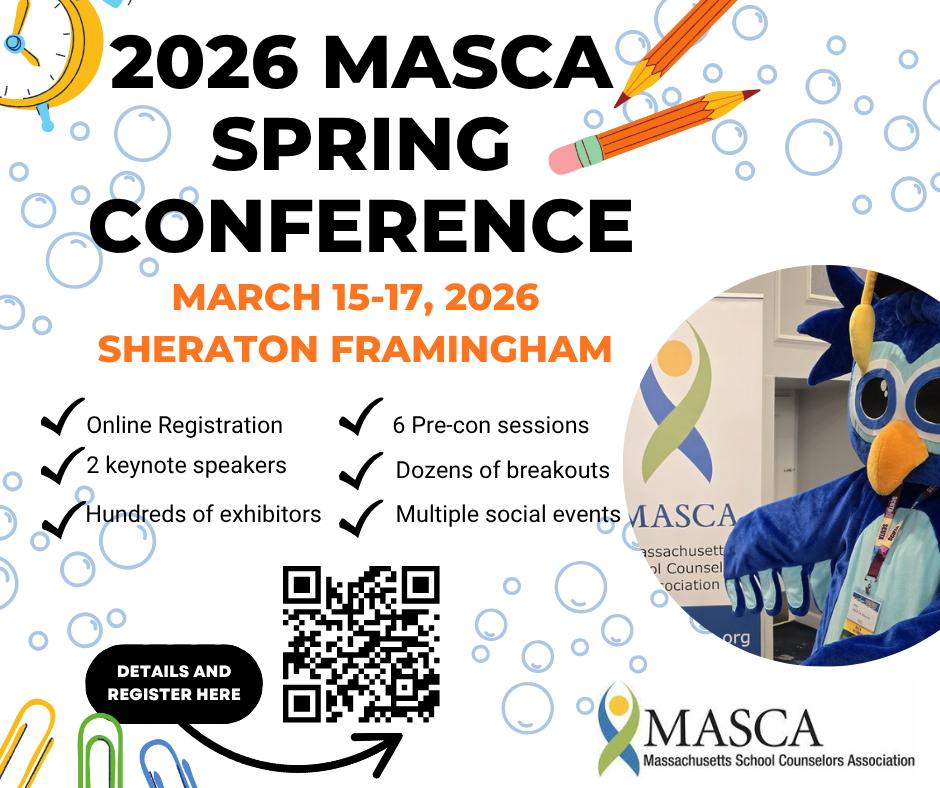
MASCA’s 2024 Special Award Recipient, Maria Ardito, will again present her webinar on Issues Facing Retirees, for colleagues anticipating retirement. Her detailed presentation and contact information will be posted on the Retiree SIG webpage. She welcomes your inquiries during the webinar:
Nov. 20 - Issues Facing Retirees - Speaker: Marie Ardito, Retirees United Retirement Specialist 3:30-4:40 via ZOOM. Register HERE Email questions to helenod@att.net with Retiree SIG in subject.
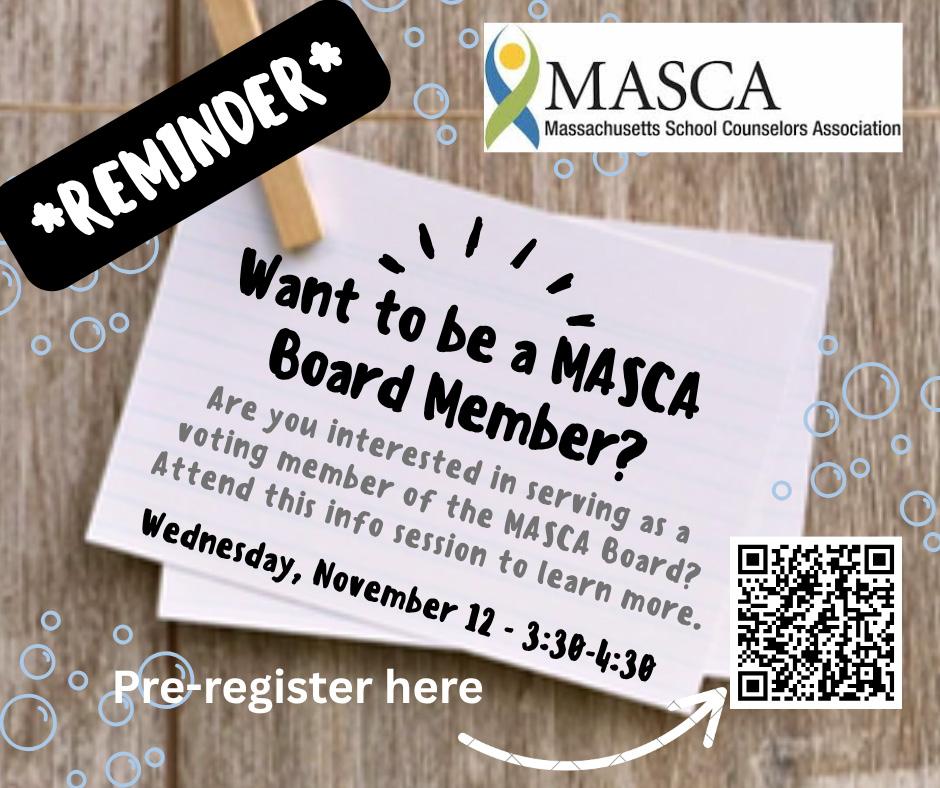

GOVERNING BOARD
Chair: Ali Robidoux
School Adjustment Counselor
New Bedford Public Schools
Assistant Chair: Cory McGann
School Counseling Department
Head
Ashland High School
Board Members
Mindy Cripps
Director of School Counseling
Billerica High School
John Crocker
Director of School Mental Health & Behavioral Services
Methuen Public Schools
Jessica Descartes
School Counselor
Tech Boston Academy
Andrea Encarnacao
School Counselor
Boston Latin School
Cynthia Esielionis
School Counselor
Ayer Shirley Regional Middle School
Lori Ford
School Counselor
Edgartown School, Martha’s Vineyard
Amanda Ugrinow
School Counselor
Westborough High School COMMITTEES
Conference
Ali Robidoux
School Adjustment Counselor
New Bedford Public Schools
Ethics
Mindy Cripps
Guidance Director
Billerican High School
Fiscal Oversight
John Crocker
Director of School Mental Health & Behavioral Services
Methuen Public Schools
Government Relations & Advocacy
Juliette Coatsworth
School Counselor
Foxborough Regional Charter School
Fran Frederick
School Adjustment Counselor
Belchertown High School
Inclusion, Diversity, Equity & Access
Vacant
MA Model
Jodi Then
School Counselor
Snowden International School, Boston
Cynthia Esielionis
School Counselor
Ayer Shirley Regional Middle School
Member Services
Tama Lang
School Counselor
Litwin Elementary School, Chicopee
Nomination and Bylaws
Jessica Descartes
School Counselor
Tech Boston Academy
Professional Recognition
Dina Sibilia
School Counselor
West Springfield High School
Tama Lang
School Counselor
Litwin Elementary School, Chicopee
Publicity
Luz Mederos Dorleans
School Counselor
Boston Latin Academy
Chris Soverow
Retired School Counselor
Research and Evaluation
Tim Poynton
Professor
UMASS Boston
School Counselor Pipeline
Jessica Almeida
School Counselor
Quinn Middle School, Hudson
Jennifer McGuire
College & Career Information
Coordinator
New Bedford Public Schools
Strategic Planning Vacant
Technology
Jennifer McGuire
College & Career Information
Coordinator
New Bedford Public Schools
APPOINTED POSITIONS
Executive Director & Member-
ship Coordinator
Bob Bardwell
Secretary
Julia Cahill-O’Shea
Counselors Notebook & Tech
Coordinator
Jean Atwater-Williams
Mentoring Coordinator
Maryanne Margiotta
Program Review Coordinator
Kari Denitzio
Diversity Fellows
Amanda Berg
ESP, Granby Elementary School
Roz Riggins-DesRuisseux School Counselor
Snowden International School, Boston
Denise Evans
School Counselor
The Carroll School
JC Topete Martinez
School Counselor
Boston Latin School
PDP Coordinator
Ali Robidoux
School Adjustment Counselor
New Bedford Public Schools
LIAISONS
Affiliate Liaison
Christine Weissman
Family & Community Engage-
ment Counselor
Ware Jr.-Sr. High School
Counselor Educator Liaison
Megan Krell
Associate Professor
Fitchburg State University
DESE Liaison
Lisa Harney
MA Dept of Elementary & Secondary Education
Emerging Leader Liaisons
Cory McGann
School Counseling Department
Head
Ashland High School
Courtney Royal
School Counselor
Gloucester High School
Graduate Student Liaisons
Ryan Beck
Gradudate Student
UMASS Amherst
Rachel Flagg
Gradudate Student
Assumption University
Nicole Ward
Gradudate Student
Boston University
EMERGING LEADERS
Allison Brann
School Counselor
Athol-Royalston Community School
Charlsey Penney
School Counselor
Challenge & Reach Academy, Worcester
Jen Pinhal
Early College School Counselor
New Bedford High School
Sara Runkle
School Counselor
Kiley Prep Middle School, Springfield
Emerging Leader
Anthony Simmons
School Counselor
Atlantis Charter School
SPECIAL INTEREST GROUP (SIG) LEADERS
Career/Technical
Annie McCarthy
School Counselor
Franklin County Technical School
Maryrose O’Neil
School Counselor
Tantasqua Regional High School
Kaitlin Monahan
School Counselor
Greater Lowell Technical High
School
Counseling Directors
Meg Clougherty
School Counseling Program
Director
Boston Latin School
Brynn Cooper
Director of Counseling
Weymouth High School
Elementary
Lori Ford
School Counselor
Martha’s Vineyard
Megan McShane
School Counselor
St Columbkille Partnership School
Maura Ricardi
School Adjustment Counselor
East Street School, Ludlow
Multilingual Learners
Priscila Anderson
School Counselor
Woburn Memorial High School
Matt Baione
School Counselor
Revere High School
Olivia Hull
School Adjustment Counselor
Brookline High School
Middle Level
Dawn Martin
School Counselor
Qualters Middle School, Mansfield
Jackie Saunders
School Counselor
Gibbs School, Arlington Retirees
Helen O’Donnell
Retired School Counselor
Anne Thidemann French
Retired School Adjustment
Counselor
School Adjustment Counselors/
School Social Worker
Nychele Clark
School Adjustment Counselor
Gardner High School
Kate Niedel
Retired School Adjustment Counselor
Anne Thidemann French Retired School Adjustment Counselor
Secondary
Karen McCrillis
School Counselor
Gardner High School
Anthony Simmons
School Counselor
Atlantis Charter School, Fall River
Rachael Weinhold
School Counselor
Winchendon High School
Urban
Rani Gould
School Counselor
The Academy at Kiley Middle School
Chase Grogan
Student Development Counselor
Community Academy of Science and Health
Sara Runkle
School Counselor
Kiley Prep Middle School, Springfield
AFFINITY GROUP LEADERS Counselors of Color
Jessica Descartes
School Counselor
Tech Boston Academy
Andrea Encarnacao
School Counselor
Boston Latin School
Aaron Spencer
School Counselor
Nashoba Valley Technical High School
LGBTQ+
Jessica Almeida
School Counselor
Quinn Middle School, Hudson
Mindy Cripps
Director of School Counseling
Billerica High School
Denise Evans
School Counselor
The Carroll School
Mission Statement:
The mission of MASCA is to elevate and advance the school counseling profession in Massachusetts through leadership, collaboration, visibility, and professional development to optimize student success.
Vision Statement:
The vision of MASCA is to equip school counseling professionals with the knowledge and skills needed to implement a comprehensive school counseling program in their school community. Through an equitable lens, we advocate that all K-12 Massachusetts students have access to a school counselor and the opportunity to become their best selves in school, their personal lives, and their communities.
Core values:
Advocacy - Committing to center the school counseling profession by highlighting and advancing the core values of school counselors, both individually and as a profession.
Equity - Requiring inclusivity, diversity, and accessibility for all school counselors and the students and families they serve
Collaboration – Working together with all stakeholders allows school counselors to deliver the highest quality school counseling program for all students.
Excellence - Maintaining the highest level of professional standards and advancing the delivery of comprehensive school counseling programs (i.e.: MA Model) for all students.
Strategic Objectives:
Objective #1 - Advocacy - Position MASCA as a recognized, valuable, and respected voice at local, state, and regional levels by building the awareness of the importance and impact of the work and role of school counseling professionals.
Objective #2 - Equity - Position MASCA as a leading organization in dismantling racist, sexist, homophobic, gendered, ableist, ageist, religious intolerance and other oppressive policies and practices while emphasizing the need for diversity and inclusion in school counseling personnel and programming.
Objective #3 - Membership - Grow MASCA membership by retaining and engaging current members, and recruiting new members, with an on-going commitment to cultivate a more diverse membership.
Objective #4 – Professional Development - Create, provide and/or promote relevant, high-quality, accessible, and timely professional development to meet the needs of our members and support the implementation of comprehensive school counseling programs.
Objective #5 – School Counselor Pipeline - MASCA must address the increasing number of unfilled school counselor vacancies and reduction of candidates entering school counseling preparation programs.
